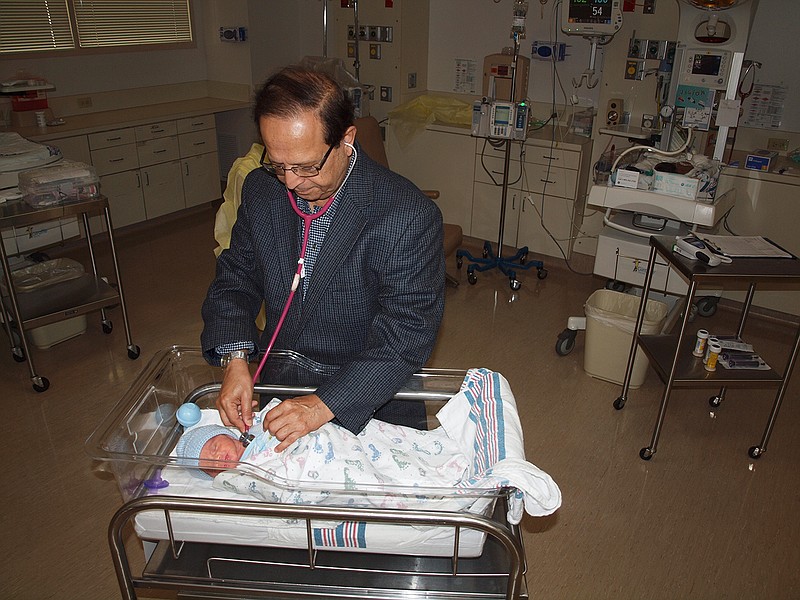Wadley Regional Medical Center provides a variety of life-saving, quality health care services to the people in this region.
One area of focus for the hospital has been its stroke program. Wadley Regional Medical Center was accredited by the Joint Commission in 2008 and was the first accredited stroke center in Texarkana.
"The accreditation means that we are providing the most up-to-date treatment for stroke. To be able to provide the most up-to-date treatment, you have to stay current with new evidence and guidelines set for by nationally recognized organizations like the American Heart Association. The guidelines they put out are how we shape our program and treatment," said Sher Fomby, cardiovascular program director.
Wadley's stroke program is widely recognized. The hospital will receive the 2018 American Heart Association Get with the Guidelines Gold Plus Elite Plus Award and is also designated by the State of Texas for the exemplary care provided to stroke patients at Wadley.
"To qualify for that achievement award from AHA, health care organizations must demonstrate compliance in seven Get With the Guidelines stroke achievement measures in at least 85 percent of all eligible patients for 24 consecutive months," Fomby said. "To qualify for the Elite Plus part of the award, they look at time to thrombolitic therapy. It must be within 60 minutes in at least 75 percent of patients who are treated with the clot buster drug tPa. In addition, to get the Elite Plus status, we have to treat 50 percent of patients in under 45 minutes."
That attention to the time between arrival at the hospital and treatment is important when it comes to successfully treating someone having a stroke.
"Time is a focus when treating stroke patients. Every minute that passes when someone is having a stroke, approximately 2 million neurons die," Fomby said.
The stroke program is headed up by Dr. Khalid Malik, stroke program medical director. He leads a team of specially trained staff.
"There is a tremendous effort from Dr. Khalid Malik. He pretty much drives the train as far as the physician piece goes. Then you have the people who coordinate the program, our front line staff in the ER and our staff on the inpatient side who work daily to provide excellent care to improve outcomes. It takes a team effort," Fomby said.
Wound care and would healing are another area where Wadley is making a positive difference in the lives of its patients. They specialize in treating patients with difficult, hard-to-heal wounds while patients of the center are treated to a family atmosphere.
"We see all kinds of different wounds," said Shannon Smith, clinical nurse manager for The Advanced Wound Healing and Hyperbaric Center at Wadley Regional Medical Center. "We want to not just treat the patient but to heal the patient. Some patients have had wounds for a very long time.
" We see our patients weekly so we really get to know them and they get to know us. We keep them on a good track and measure wounds to make sure they're decreasing in size. We want to have the wound healed by 14 weeks, but usually with 95 percent of our patients we have them healed within 30 days."
"We have a patient that had a chronic wound for three years. It just seemed to get bigger and bigger. It was a difficult wound to heal but we've slowly been able to get her wound healed," Smith said. "It's a big deal because people change their daily routines to work around caring for these wounds. It definitely can be challenging and life-changing for them. That's what we're here for- to heal wounds so they can get back to living normal lives."
Dr. Mark Sutherland, a general surgeon, his wife Caroline Sutherland, a family nurse practitioner, along with Dr. Robert Klein, a podiatrist and certified wound specialist who specializes in foot and ankle wounds, lead the staff at the wound care center.
Some of the treatments used include hyperbaric treatments, negative pressure wound therapy, compression therapy and bio skins that are advanced tissue products.
"Hyperbarics are used for patients who have a bone infection or that have had radiation treatment in the past and are having symptoms from it later," Smith said.
Wadley Regional Medical Center has been the Birth Place of Texarkana for generations. It boasts the highest quality of care for women and babies through its Women's Services and Maternal Child Care services.
"We're special because we have a highly-trained staff, a friendly environment and we care about patient safety," said Antonette Reed, director of maternal child services. "We provide whatever the patient needs. That's our focus. We have 24-hour a day coverage from staff and our neonatologist."
"We're a 10-Step Hospital. That means we've gone through designation by the Texas Department of Health. We have all the parameters to safely care for moms and babies in a certifiable way. Moms are able to leave our hospital well-prepared to care for their babies at home," Reed said.
Wadley offers new moms a breastfeeding support with a lactation consultant and breastfeeding support groups.
"They can talk with other mothers and the lactation consultant about issues they may be having. They share with other women and the women bond, so it's really a great support system," Reed said.
Wadley's Neonatal Intensive Care Unit received its Level 2 designation in November 2017.
"We're recognized to take care of premature babies in a Level 2 nursery. It was a great accomplishment," Reed said. "We have very experienced staff, many of which have advanced fetal monitoring and our OB doctors stay in house 24 hours a day, so they don't leave when they're on shift."


